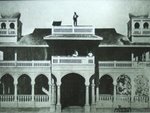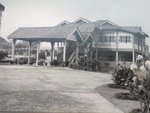[This article was published in Australia's Sydney Morning Herald on 24 October 2010]
Steve McKenna swings from royalty to rainforest in one of south-east Asia's most underrated destinations.
MY HEART is beating faster than normal as I approach the Sultan of Brunei. We're in the lavish surrounds of his 1788-room palace, standing beneath a ceiling coated in crystal and, although it feels like a dream, I don't have time to pinch myself.
Smiling and looking genuinely pleased to see me, his majesty shakes my hand. It's neither a wet fish nor a bone cruncher. It's just right, in fact, though I'm not surprised by his expertise, considering the amount of practise he gets.
Advertisement: Story continues below
The sultan will greet about 50,000 people in the course of the weekend as part of the celebrations for Hari Raya, an annual festival that follows the Muslim fasting month of Ramadan. For three days, Bruneians and foreigners can visit the palace, where a buffet bulging with treats is laid on, compliments of his majesty.
Bellies full, men then queue to meet the sultan and male members of the Bruneian royal family (including eccentric playboy Prince Jefri). Women are shepherded to another opulent room, where the queen and princesses await. Later, everyone leaves with a gift. This year, it's cake.
A sovereign state swimming in oil on the north coast of the island of Borneo, Brunei boasts far more than just regal splendour and black gold (more than 1 billion barrels' worth of oil has been pumped out since the resource was first tapped in 1929).
In four days, I'm won over by the country's jewels: tropical jungles teeming with wildlife, atmospheric villages, sublime Islamic-influenced architecture, delicious, spicy Malaysian-style cuisine and friendly people - many of whom speak fluent English as well as Malay, the official language.
Brunei was a British protectorate from 1888 to 1984 and still bears a few influences - driving on the left-hand side, for instance. However, religion holds greater sway: Islam arrived here with Arab traders in the 14th century and the sultan is part of a dynasty that claims direct descent from the prophet Muhammad. On his watch, Friday prayers are near-sacrosanct, aspects of Sharia law are in force and alcohol is essentially banned (though foreigners can bring 12 cans of beer and two bottles of wine or spirits through customs for private use).
Yet Brunei is no fundamentalist backwater and instead lives up to its full name, Brunei Darussalam (Abode of Peace). Various religions flourish here, violent crime is virtually non-existent and Bruneinan women wear a mix of Western-style clothes and traditional Malay outfits and headscarves. Brunei's capital, Bandar Seri Begawan, is small, clean, green, low-key and laid-back. Also shorn of pesky street salesmen and choking traffic jams, it's a fine base for exploring the country.
As well as two huge, beautiful mosques and a clutch of intriguing museums, Bandar offers Kampong Ayer - a collection of "floating" villages that have huddled here, in some form, for a millennium.
Home to about 20,000 people, Kampong Ayer was mentioned in the chronicles of Antonio Pigafetta, a member of Ferdinand Magellan's 16th-century round-the-world expedition, which passed through Borneo's waters.
Treading the boardwalks linking Kampong Ayer's wooden stilt homes, workshops, schools and medical centres, I chat with locals.
Most homes have satellite dishes, while the government's oil-rich coffers means healthcare and education are free for all citizens, there's no income tax and petrol is cheap (about 30¢ a litre). Much of Brunei is covered in rainforest and on a water-taxi tour of the jungle-fringed waterways around Bandar, I spot proboscis monkeys and macaques swinging between branches and crocodiles sunbathing in mangroves.
I also venture deeper into Brunei's interior by motor boat, to Temburong, the smaller, eastern slice of Brunei. Split from Bandar, and its more populated western part by Malaysia's state of Sarawak, Temburong is home to Ulu Ulu, a rainforest eco-resort where you relax to the sounds of chirping crickets and cicadas, or tackle a raft of jungle-based adventures. Early next morning, I'm woken by a guide and embark on a sweaty, humid 30-minute trek to a vantage point overlooking the misty rainforest canopy. The prize is seeing a magical, almost ethereal, Borneo sunrise. My last night in Brunei is spent at the sumptuous Empire Hotel and Country Club, said to be a favourite hang-out of the sultan, his polo-playing friend Prince Charles and Bill Clinton. Built a decade ago on the fringes of the South China Sea for a reported $1.1 billion, the club is a riot of Italian marble, gilded columns and shimmering chandeliers, with a spa, pools and a Jack Nicklaus-designed golf course.
As I enjoy a glass of red on my balcony, I toast Brunei. Australians are spoilt for choice when it comes to stopovers in Asia and although the sultanate lacks the fame of Hong Kong or Singapore, the country is every bit as rewarding.
The writer was a guest of Royal Brunei Airlines.
Trip notes
Getting there
Royal Brunei flies from Brisbane to Brunei priced from $620 return, with connections to other Asian cities and London (alcohol-free flights). (07) 3860 6700, bruneiair.com.
Staying there
Radisson Hotel in Bandar has double rooms priced from $Br165 ($130) a night. +673 224 4272, www.radisson.com/brunei. Empire Hotel and Country Club rooms are from about $Br400 a night. + 673 241 8888, theempirehotel.com. A night at Ulu Ulu Resort, including transfers, activities and meals, is from $Br350 a person, twin share. + 673 244 1791, uluuluresort.com.
Welcome to my private journal generally on Brunei issues. Any opinions expressed are in my personal capacity. All rights to the articles are reserved.
Tuesday, October 26, 2010
Subscribe to:
Post Comments (Atom)







No comments:
Post a Comment